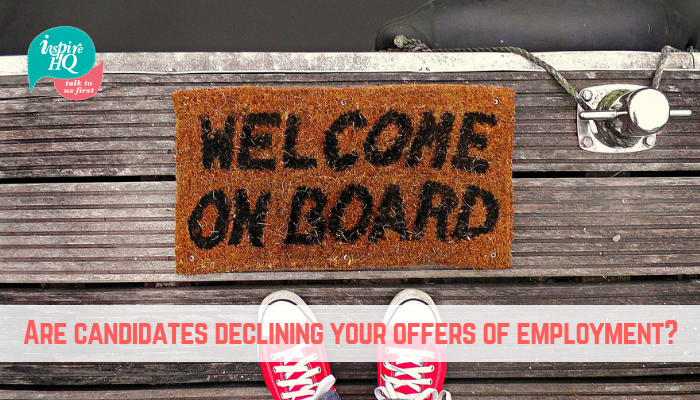It’s a competitive market for recruiting top talent right now. If you’re involved in the hiring process, you will have likely noticed that it’s a candidate short market in many sectors and you too may have experienced more and more candidates declining your job offers. Employers are telling me they get frustrated by going through a recruitment process only to have their preferred candidate decline their offer of employment. Then it’s back to the drawing board. To start the process all over again, incurring more time and money costs.
A candidate short market means that often candidates have choice. As an employer you are competing with other employers to attract that talented candidate. In addition to that it’s important to remember that just as you are assessing the candidate for their suitability, the candidate is assessing you, the employer for your suitability and they are comparing you to other employers. What impression are you giving the candidate and are your actions scaring them off; deterring them from wanting to work for your business?
There are a few things you can do if you are struggling to get candidates across the line. Running a professional, timely and engaging recruitment process is key, so assuming you have handled that end of the process well, how you conduct the post interview interactions is very important.
- Keep up the communication
Once you have conducted the interview and have determined your preferred candidate/s it’s important to keep up the communication. I regularly have candidates tell me they had an interview, they thought it went well but it’s a week or two later and they still haven’t heard anything. While you might be busy in the background working through the recruitment process, letting the candidate know within 24 to 48 hours that you were impressed with them at interview will help keep them engaged. The longer the period of time from interview to the next communication the less engaged the candidate will be. You may not necessarily have news or an update on the next steps but you can let them know you are still considering their application.
- Post interview, ask for feedback
It’s quite possible that a candidate has attended an interview and while you may think this person would be a great addition to your team, they may not feel the same way. Many employers conduct an interview and continue the recruitment process, not stopping to ask the candidate for feedback and are shocked when they decline. This can be frustrating because you have wasted further time going through the process when it was highly likely the candidate was never going to accept but just hadn’t taken the step and withdrawn their application. Contacting the candidate 24 to 48 hours after their interview and asking for their feedback will not only impress the candidate but it gives them the opportunity to raise any concerns or ask more questions. We all know that sometimes the minute you leave the interview that burning question you wanted to ask pops in to your mind. By asking for feedback you can deal with and hopefully overcome any questions and concerns the candidate has. This can save time progressing things to offer stage if the candidate simply has too many concerns or it removes the concerns so that working through the offer isn’t complicated.
- Pace the process to suit the candidate
While you don’t want to delay the process, rush it or cut corners it is important to consider the candidates style and how the timeliness of the process may impact their decision. Leaving the candidate hanging post interview is never good but offering the job on the spot at interview or within hours of the interview may in fact scare them off. Depending on the candidates decision making style you may need to tweak your timeline. For example you may not feel you need to interview the candidate again and you are comfortable making them an offer after the first interview however the candidate may need and want that second face to face meeting to determine if you are the right manager and company for them. Maybe catching up for a coffee will reassure them, or pre-empting that you are formalising a formal offer of employment and will have an offer to present to them by tomorrow will allow them time to prepare themselves for the offer instead of it coming as a surprise and catching them off guard.
We can sometimes forget that the candidates is our customer in the recruitment process. Would you treat your customers the same way you treat job candidates? Putting yourself in the shoes of the candidate and making sure that we don’t let the recruitment process slip once the interview is done and dusted will help make sure more candidates are accepting your job offers.


